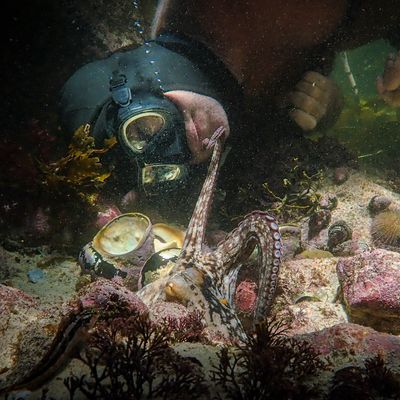
Last week, a giant leopard slug followed me home in a bag of takeout. I had been outdoor dining with friends in a garden, and this Limax maximus had hitched a ride unnoticed on the F train all the way back to my apartment, where he inched his way out of the paper bag and started poking around. I hate bugs, but I found this slug extremely adorable. Something about him (I decided he was a “him” and named him Sluggo and kept him in a makeshift terrarium for exactly one day before releasing him into a garden) was so far from human that he didn’t feel scary in the way that a leggy cockroach feels scary. He was this blank-enough other creature that I projected all kinds of personality onto, deciding he was cute and feeding him tiny broccolis until it was clear he had to get back outdoors for his own happiness. Maybe he’d be eaten by a pigeon, maybe he wouldn’t, but his fate wasn’t mine to decide.
Everything I just wrote is more or less the gist of Netflix’s new Oc-Doc My Octopus Teacher, which sounds like the name of an anime but is actually a lyrical documentary by South African filmmaker Craig Foster about his relationship with an octopus who lived in a kelp forest near his house on the cape. The film became an unlikely topic of Twitter conversation this week after scholar Sophie Lewis wrote a thread in which she described the movie as being “about a straight man who has a life-changing erotic relationship with a female octopus.” Lewis employs queer semiotics in her reading of the film, referencing Hokusai’s Dream of the Fisherman’s Wife as she states point-blank that Foster and the octopus “have a form of sex” at one juncture. I had to know: How horny is My Octopus Teacher, really? I’m not normally a nature-doc person, but I wanted to see if a man really did perform coitus with an octopus.
Short answer: He didn’t.
Long answer: Yes, there are a lot of things in My Octopus Teacher that can be read as sexual or, at the very least, kinky. The ocean is obviously, inherently erotic. If we don’t agree about that up front, then you’ve directly insulted my salty giant wife, the sea. As Lewis suggests, just watch The Lighthouse to see the ways in which the ocean is so often portrayed in art as sexy and dangerous (see also the Angelina Jolie fish from Shark Tale). And this is a movie about a Wet Ass (Octo)Pussy after all, so there are squishy, squelchy noises and long close-ups of tender fleshy folds. His attraction to the octopus is certainly to a certain degree physical, his documentarian’s gaze taking the backseat to a tactile way of engaging. He holds out his hand and is emotionally overcome when she crawls to it and rides with him to the surface. He fingers her suckers and sneaks out at night to see her; My Octopus Teacher really is the story of an affair. I can see how someone in the world of sexuality and gender studies would automatically jump to an erotic reading of the film. But I’m just not convinced that, in the scenes where he skin dives and pets the octopus on his chest, either Foster or the octopus is taking away anything sexual from the encounter. It looks much more like an owner stroking his cat.
Foster and the octopus share something in common: They’re both motivated by curiosity. He dives every day without a tank to observe her, and she in turn observes him. When she camouflages herself with kelp to hide from predators or to spy on prey, with just an eyeball peeking out, I was reminded of those scenes in Planet Earth when a filmmaker would hide in a hollowed-out tree or some other foliage to get good footage of the birds. Foster is fascinated by his own reaction to the octopus as an intelligent but unknowable being, and the documentary does a great job of showing us how the octopus could be seen as a complex individual. But while so much of the surface-level sensory material of this documentary could be seen as kinky, the relationship between Foster and the octopus is more nebulous than sexual or erotic.
If anything, My Octopus Teacher is actively sex negative. When a shark bites off one of the octopus’s legs, Foster, deploying the most overtly Freudian line in the movie, says that he “psychologically felt like I was going through my own type of dismembering.” So he sees her and sees a loss of phallus entirely. And when the octopus finally has actual sex with an actual male octopus, it leads to entropy and death, because octopi die shortly after they mate. In the world of My Octopus Teacher, where Foster’s wife is literally never mentioned and he spends all day shunning human life to stare at an octopus who dies after she mates, sex is annihilation.
The octopus does slowly die as she tends to her eggs, which number in the hundreds of thousands and are scattered everywhere. There’s a bittersweet scene near the end of the film when Foster and his son find a tiny baby octopus and Foster says he likes to think it’s one of hers. During all of this, the thing I thought of most was Charlotte’s Web, which is probably a much better analogue to My Octopus Teacher than any ancient Japanese tentacle porn. Charlotte’s Web is chaste and bittersweet and about forging relationships and trying to communicate between species, with death always looming over. It’s intimate, but that doesn’t make it necessarily erotic. Craig Foster doesn’t fuck the octopus.


